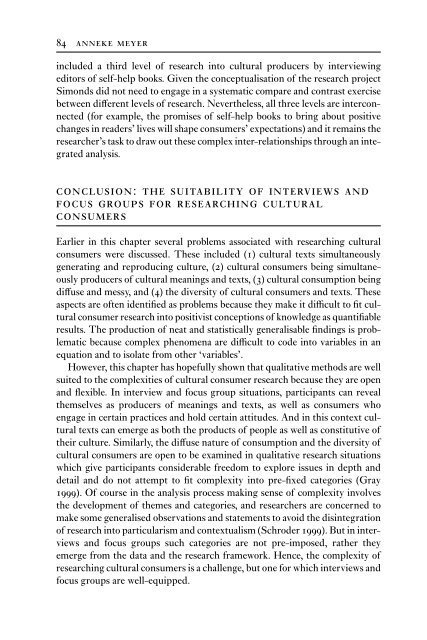Research Methods for Cultural Studies
Research Methods for Cultural Studies
Research Methods for Cultural Studies
Create successful ePaper yourself
Turn your PDF publications into a flip-book with our unique Google optimized e-Paper software.
84 anneke meyer<br />
included a third level of research into cultural producers by interviewing<br />
editors of self-help books. Given the conceptualisation of the research project<br />
Simonds did not need to engage in a systematic compare and contrast exercise<br />
between different levels of research. Nevertheless, all three levels are interconnected<br />
(<strong>for</strong> example, the promises of self-help books to bring about positive<br />
changes in readers’ lives will shape consumers’ expectations) and it remains the<br />
researcher’s task to draw out these complex inter-relationships through an integrated<br />
analysis.<br />
conclusion: the suitability of interviews and<br />
focus groups <strong>for</strong> researching cultural<br />
consumers<br />
Earlier in this chapter several problems associated with researching cultural<br />
consumers were discussed. These included (1) cultural texts simultaneously<br />
generating and reproducing culture, (2) cultural consumers being simultaneously<br />
producers of cultural meanings and texts, (3) cultural consumption being<br />
diffuse and messy, and (4) the diversity of cultural consumers and texts. These<br />
aspects are often identified as problems because they make it difficult to fit cultural<br />
consumer research into positivist conceptions of knowledge as quantifiable<br />
results. The production of neat and statistically generalisable findings is problematic<br />
because complex phenomena are difficult to code into variables in an<br />
equation and to isolate from other ‘variables’.<br />
However, this chapter has hopefully shown that qualitative methods are well<br />
suited to the complexities of cultural consumer research because they are open<br />
and flexible. In interview and focus group situations, participants can reveal<br />
themselves as producers of meanings and texts, as well as consumers who<br />
engage in certain practices and hold certain attitudes. And in this context cultural<br />
texts can emerge as both the products of people as well as constitutive of<br />
their culture. Similarly, the diffuse nature of consumption and the diversity of<br />
cultural consumers are open to be examined in qualitative research situations<br />
which give participants considerable freedom to explore issues in depth and<br />
detail and do not attempt to fit complexity into pre-fixed categories (Gray<br />
1999). Of course in the analysis process making sense of complexity involves<br />
the development of themes and categories, and researchers are concerned to<br />
make some generalised observations and statements to avoid the disintegration<br />
of research into particularism and contextualism (Schroder 1999). But in interviews<br />
and focus groups such categories are not pre-imposed, rather they<br />
emerge from the data and the research framework. Hence, the complexity of<br />
researching cultural consumers is a challenge, but one <strong>for</strong> which interviews and<br />
focus groups are well-equipped.


